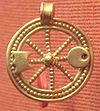Belatucadros
This article includes a list of references, related reading, or external links, but its sources remain unclear because it lacks inline citations. (March 2013) |
In Celtic mythology, Belatucadros or Belatucadrus, was a deity worshipped in northern Britain, particularly in Cumberland and Westmorland. He may be related to Belenus and Cernunnos, and was equated in the Roman period with Mars. He appears to have been worshipped by lower-ranked Roman soldiers as well as by Britons.
Belatucadros is known from approximately 28 inscriptions in the vicinity of Hadrian's Wall, England. The spelling of the god's name varies a great deal, and dedications to Balatocadrus, Balatucadrus, Balaticaurus, Balatucairus, Baliticaurus, Belatucairus, Belatugagus, Belleticaurus, Blatucadrus and Blatucairus are generally accepted as variants of Belatucadros. The most common of these forms is Belatucadrus, which as a result is the name generally used in modern writings. In five of these inscriptions, Belatucadros is equated with the Roman god Mars as Mars Belatucadrus.
The altars dedicated to Belatucadros were usually small, simple and plain, leading to the suggestion that this god was mainly worshipped by people of low social status.
The name is frequently glossed as ‘fair shining one’ or ‘fair slayer’ presumably because the first syllable of the name is analogous to the reconstructible Proto-Celtic element *belo- ‘bright.’ This element is reconstructed as *belo- for Proto-Celtic in the Proto-Celtic lexicon [1]. The element is linked to the Indo-European root *bhel- ‘shine’ [2]. However, a cursory glance at the Proto-Celtic lexicon [3] reveals that *belatu- is reconstructible for Proto-Celtic with the meaning ‘death’ and that *kadro- is a reconstructible element meaning ‘decorated.’ So the name Belatucadros may also be interpreted as a compound of two Gallic words descended from two Proto-Celtic elements *belatu- and *kadro- which together as a compound adjective would literally mean ‘[the] death-decorated [one].’ Indeed, this is hardly an original proposal for the meaning of the name of this god associated with Mars: MacCulloch as early as 1911 (p135) glossed this god’s name as ‘comely in slaughter’ [4]. So ‘fair shining one’ or ‘fair slayer’ is not the only gloss acceptable for this theonym.
References
- Coulston, Jon C. & Phillips, E.J. (1988). Corpus Signorum Imperii Romani, Great Britain, Volume I, Fascicule 6. Hadrian's Wall West of the North Tyne, and Carlisle (p. 55). New York and Oxford: Oxford University Press. ISBN 0-19-726058-6.
- Fairless, K.J. (1984). "Three religious cults from the northern frontier region" (p. 225–228). In R. Miket and C. Burgess (eds.), Between and Beyond the Wall. Essays on the Prehistory and History of North Britain in Honour of George Jobey (pp. 224–242). Edinburgh: John Donald Publishers. ISBN 0-85976-087-1.
- Green, Miranda J. (1992). Dictionary of Celtic Myth and Legend (p. 42). London: Thames and Hudson. ISBN 0-500-01516-3.
- MacCulloch, J. A. (1911). The religion of the ancient Celts. New York: Dover Publications. ISBN 0-486-42765-X
- Ross, Anne (1967). Pagan Celtic Britain. Routledge & Kegan Paul. ISBN 0-902357-03-4.


